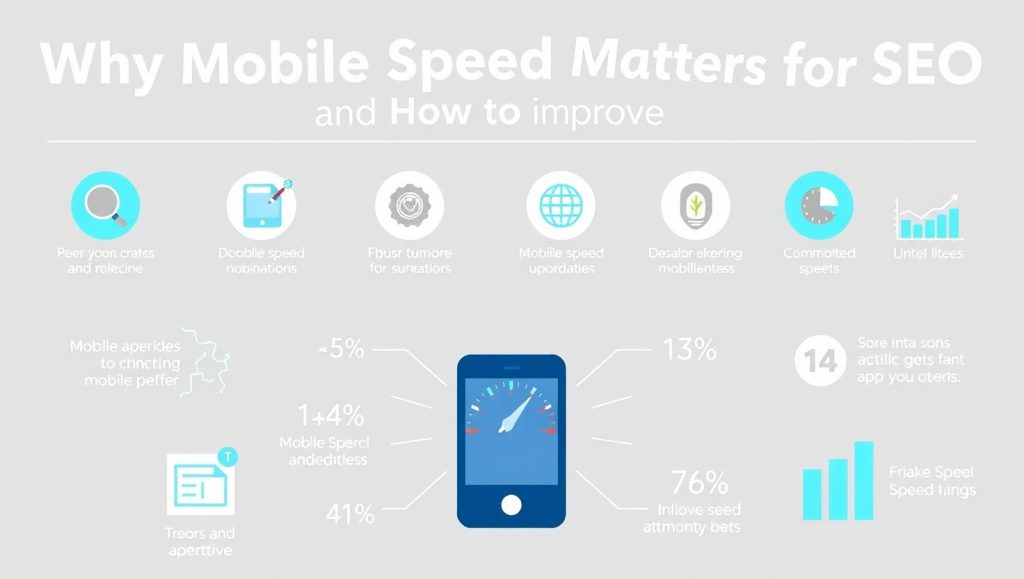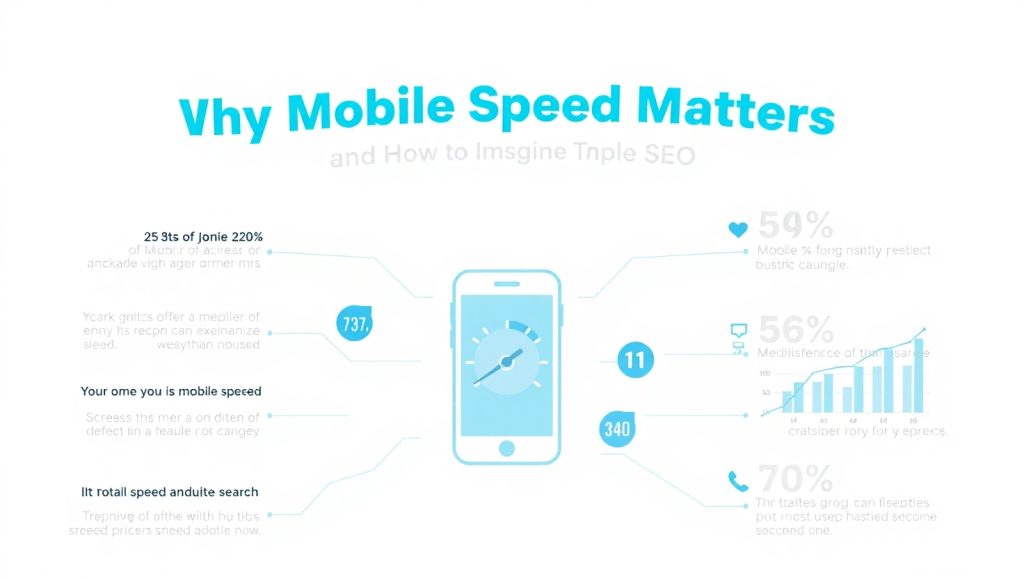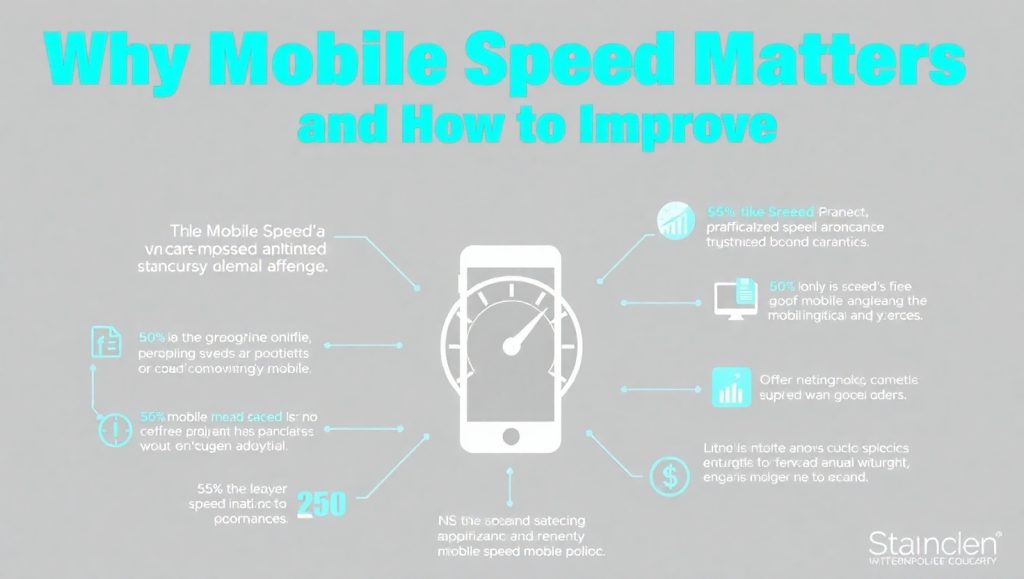
The Crucial Connection Between Mobile Speed and SEO
More than half of the world’s online traffic comes on mobile devices today, which influences every aspect of internet activity — from news checking, online shopping, or even business research. In view of this shift, the mobile website speed becomes a major ranking factor for the search engines like Google. Just imagine how incredibly slow loading into mobile form will frustrate users if they immediately abandon the site, which Google notices. Search engines, therefore, concern themselves with factors like user experience. In general, if it becomes fast and smooth to mobile access, the visitors can remain in the site and interact with it and finally convert as customers. Just by showing that delay of one second in mobile loadings converts up to 20% less. That’s a huge effect when it comes to potential business.
Other than just focusing on a perfect user experience, mobile speed directly affects so many SEO signals – bounce rate, time on site, and engagement – all getting degraded when your site is slow to load. Load time and interactivity are now a huge concern for Google’s Core Web Vitals edition of page experience, more so on mobile devices. Rise above this to continue enjoying visibility in search engine results pages (SERPs) and not just live with great writing.
It is not only what their site states that the businesses should focus upon for growing in the online race now, but also the speediness with which it offers that experience to the users. Services like website design Swansea or even an entire ecommerce store can no longer afford to treat mobile speed optional but rather ought to consider the essentiality of it.
How Google Measures Mobile Page Speed
Google uses several tools and metrics to measure how fast a website loads on mobile devices. One of the most important is PageSpeed Insights, a free tool that analyzes your site’s performance. It focuses on real-world user data through something called the Chrome User Experience Report (CrUX).
Another critical set of metrics is Core Web Vitals. These include:
- Largest Contentful Paint (LCP): Measures loading performance. Ideally, it should happen within 2.5 seconds.
- First Input Delay (FID): Measures interactivity. It should be less than 100 milliseconds.
- Cumulative Layout Shift (CLS): Measures visual stability. Pages should maintain a CLS of less than 0.1.
If your website doesn’t meet these thresholds, Google considers it a poor experience for users — which can lower your search rankings.
Moreover, Googlebot (crawler of Google) also now almost exclusively primarily uses that ever mentioned mobile-first indexing. Therefore, it is the main crawling and first indexing basis of your site – that is the mobile version. Slow or completely broken mobile sites usually show case your content poorly ranked as against a perfect desktop site performance.
Routine auditing with an instrument like Google Search Console can help identify mobile speed issues early enough for pre-emptive remediation before spoilage of SEO performance. If you mean to grow, you cannot ignore what Google’s metrics are saying.
Major Factors That Slow Down Mobile Websites

Understanding what slows your site down is the first step toward improving it. Here are the most common mobile speed killers:
- Heavy images: Large, unoptimized images take forever to load, especially on slower mobile networks.
- Unnecessary scripts: JavaScript files that aren’t essential to a page’s function can bog down load times.
- Too many HTTP requests: Every file (CSS, JS, images) needs a request to the server. More requests equal slower loading.
- Poor server response times: A slow hosting server can dramatically increase your site’s loading time.
- No caching: Without browser caching, returning visitors have to load everything from scratch again.
Even the simplest of design choices could inadvertently gain speed. Too many animations, an extra-large popup that blocks your view of the site, or even an incorrect font format will add milliseconds that accumulate to seconds and cost you users.
These little tweaks will help your site also with search engine optimization. But even more, they will create pleasant experiences for the visitors, who are more likely to stay, engage, and trust your brand. If one is providing a service such as web design in Cardiff, then these innuendos must first be applied to their own website prior to propagating them to potential clients.
How to Improve Mobile Website Speed
Boosting mobile speed may sound complicated, but there are clear, practical steps you can take to see immediate improvement:
- Optimize images: Compress your images using tools like TinyPNG or use next-gen formats like WebP. Make sure your images are sized properly for mobile screens.
- Minify code: Remove unnecessary spaces and comments from HTML, CSS, and JavaScript files. Tools like Minifier or online compressors can help.
- Use a Content Delivery Network (CDN): A CDN like Cloudflare or Amazon CloudFront stores your content in multiple locations around the world. Users get served from the nearest location, improving speed.
- Enable browser caching: This lets returning visitors load your site much faster because elements are stored locally on their device.
- Choose a fast, reliable host: A cheap hosting provider can seriously slow down your mobile speed. Invest in good hosting that specializes in speed and security.
Also, regularly testing your mobile website using Google PageSpeed Insights and GTMetrix is crucial. These tools offer actionable tips tailored to your site’s specific issues.
If you offer services like SEO Cardiff, your website should be a living example of excellent mobile optimization. Otherwise, it’ll be hard to convince clients you can help them if your own site underperforms.
Mobile Speed and Its Impact on Conversions

There’s a direct link between mobile speed and sales, leads, or any kind of online success. Every additional second it takes for your website to load, you lose valuable customers.
Research shows that:
- 53% of mobile users abandon a site that takes longer than 3 seconds to load.
- Sites that load in 5 seconds see 70% longer average sessions compared to sites loading in 19 seconds.
- Mobile sites that load in 1 second have a conversion rate 3x higher than sites that load in 5 seconds.
Past a certain point of waiting, visitors will assume that your company is outdated or unreliable. This negative first impression is hard to shake-off. Speed is not only technical; it’s a part of your brand experience.
Any business that wants to maximize conversions needs to treat speed optimization with as much seriousness as it does designing or SEO content strategy. Whether a retailer, local service provider, or international brand, fast mobile performance has a direct link to the bottom line.
Conclusion
Speed is no longer about just ‘going fast’ today; that’s how you talk about experience delivery-to-users and for search engines to pay. So the pain is, mobile traffic will always increase, and a slow mobile site has ceased to be just an inconvenience; it’s become a risk for your business.
Even more will Google’s algorithms prioritize speed and user experience in the future. That is, sites that are investing in mobile performance will find themselves winning more traffic, achieving better rankings, and converting more visitors into loyal customers.
If you want your website – and your business to succeed – to be trend setters in the industry, topmost should be focusing on mobile speed in your list of SEO priorities. This is exactly the fact already known by the specialized website design Penarth-specially tasters and top marketing agencies, and are doing great in investment for mobile optimization.
.